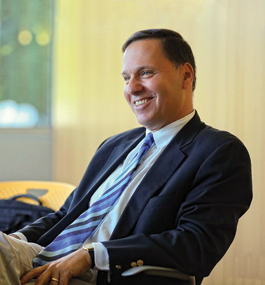From the President
Looking Back, Looking Ahead

Mike Lovett
President Ronald D. Liebowitz
In the last issue of Brandeis Magazine, I described a series of conversations about Brandeis’ Jewish identity that I had just begun having with various groups across the university. The goal of these discussions was to give clarity to the institution’s identity — how we speak about ourselves to prospective students, faculty, and staff, and how we might chart our future while valuing our past. Simply saying we are “a nonsectarian, Jewish-sponsored university,” which has been the pitch for decades, doesn’t do justice to our past or describe how that past relates to our future.
As I met with groups of students, faculty, staff, donors, parents, and friends of the university, I learned a great deal about how each constituency understands Brandeis’ founding and the Jewish values that inspired it. I also learned that so many of them didn’t know about the university’s rich history or about the diversity within the Jewish community, on campus and beyond.
Before each meeting, I made available to each group a set of background materials, intended to be a primer on Brandeis’ founding and on how, if at all, the founding should inform the university’s present and future. The collection of readings offered various commentaries on the principles that guided the university’s admissions and hiring policies, as well as critiques of its attempts to create a diverse and more inclusive learning environment.
The principle of “openness” described in most of the readings — how, from the start, all meritorious individuals would be offered admission and jobs regardless of their identities — was met with great approval, yet also a surprising degree of unawareness. We discussed how this principle is rooted in millennia-old Jewish history and tradition. The readings also underscored the university’s commitment to other long-held Jewish values: a reverence for learning, critical thinking and questioning, and a commitment to helping repair the world. These values and principles are as relevant today as they ever were, but they require an updating — a “contemporizing” — to meet the needs of the future.
When the university was founded in 1948, there were quotas for Jews at leading colleges and universities. Women, Blacks, and other minorities faced similar prejudice. Brandeis was founded to counter such antisemitism and bigotry in higher education. In fact, in one of the readings I had made available for the discussions — an article in a 1952 issue of Ebony magazine, the leading African American magazine at the time — Brandeis was praised for operating “on a set of democratic principles which could easily serve as goals for every other university in the United States.”
In discussing the Ebony article, several students asked why they hadn’t known of this history before — why this important point of pride for Brandeis was, oddly, never shared or discussed. These students recommended sharing this history with all incoming students, faculty, and staff during orientations for each group. They also wondered aloud about how the institution’s founding values, which focused on openness and opportunity, could help all those who come to Brandeis feel more a part of the institution’s everyday life.
The meaningfulness of the university’s history and founding values resonated not only with students but also with many alumni, current parents, parents of alumni, and longtime friends. Our current students insisted that we share our history more deliberately and encouraged us to extend our commitment to diversity more purposely to inclusivity. Our older discussants underscored the importance of Brandeis reconnecting more, and more meaningfully, with the American Jewish community — the group that founded and nurtured the institution to maturity. It is clear to me, following these discussions, that the university needs to do both, and that doing both is a large part of what it means to contemporize our history and founding principles.
Our Jewish values have long underpinned the strengths of the university, and it is incumbent on all of us to continue to uphold our rich tradition for future generations of Brandeisians — Jews and non-Jews alike.
Best regards,
Ronald D. Liebowitz
